Entrepreneurship and Small Business Management Report - Module Report
VerifiedAdded on 2020/12/18
|17
|5576
|182
Report
AI Summary
This report delves into the realm of entrepreneurship and small business management, providing a comprehensive overview of various entrepreneurial ventures, including private, public, and social enterprises. It examines the similarities and differences between these ventures, highlighting their roles in economic development, particularly within the UK context. The report analyzes the impact of micro and small businesses on the UK economy, providing statistical data on employment, turnover, and the distribution of businesses across different regions. Furthermore, the report explores the characteristics and skills of successful entrepreneurs, using Bill Gates as a case study to illustrate the impact of cultural background, education, and lifestyle on entrepreneurial success. The report also discusses the scope and development of both public and private enterprises, offering insights into their growth potential and societal contributions. Overall, the report provides valuable insights into the dynamics of entrepreneurship and the significant role that small businesses play in driving economic growth and innovation.

Entrepreneurship and Small
Business Management
Business Management
Paraphrase This Document
Need a fresh take? Get an instant paraphrase of this document with our AI Paraphraser
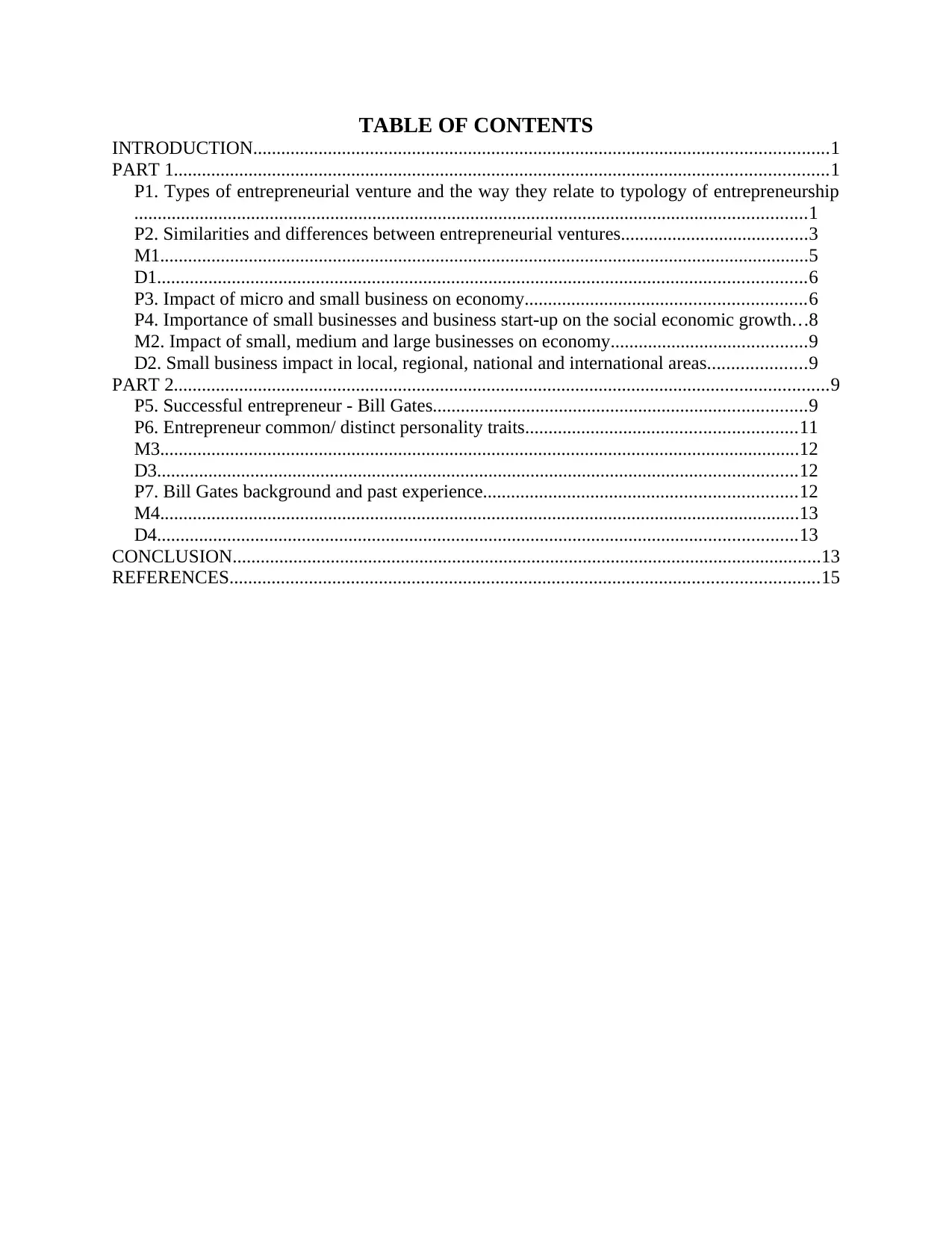
TABLE OF CONTENTS
INTRODUCTION...........................................................................................................................1
PART 1............................................................................................................................................1
P1. Types of entrepreneurial venture and the way they relate to typology of entrepreneurship
................................................................................................................................................1
P2. Similarities and differences between entrepreneurial ventures........................................3
M1...........................................................................................................................................5
D1...........................................................................................................................................6
P3. Impact of micro and small business on economy............................................................6
P4. Importance of small businesses and business start-up on the social economic growth...8
M2. Impact of small, medium and large businesses on economy..........................................9
D2. Small business impact in local, regional, national and international areas.....................9
PART 2............................................................................................................................................9
P5. Successful entrepreneur - Bill Gates................................................................................9
P6. Entrepreneur common/ distinct personality traits..........................................................11
M3.........................................................................................................................................12
D3.........................................................................................................................................12
P7. Bill Gates background and past experience...................................................................12
M4.........................................................................................................................................13
D4.........................................................................................................................................13
CONCLUSION..............................................................................................................................13
REFERENCES..............................................................................................................................15
INTRODUCTION...........................................................................................................................1
PART 1............................................................................................................................................1
P1. Types of entrepreneurial venture and the way they relate to typology of entrepreneurship
................................................................................................................................................1
P2. Similarities and differences between entrepreneurial ventures........................................3
M1...........................................................................................................................................5
D1...........................................................................................................................................6
P3. Impact of micro and small business on economy............................................................6
P4. Importance of small businesses and business start-up on the social economic growth...8
M2. Impact of small, medium and large businesses on economy..........................................9
D2. Small business impact in local, regional, national and international areas.....................9
PART 2............................................................................................................................................9
P5. Successful entrepreneur - Bill Gates................................................................................9
P6. Entrepreneur common/ distinct personality traits..........................................................11
M3.........................................................................................................................................12
D3.........................................................................................................................................12
P7. Bill Gates background and past experience...................................................................12
M4.........................................................................................................................................13
D4.........................................................................................................................................13
CONCLUSION..............................................................................................................................13
REFERENCES..............................................................................................................................15
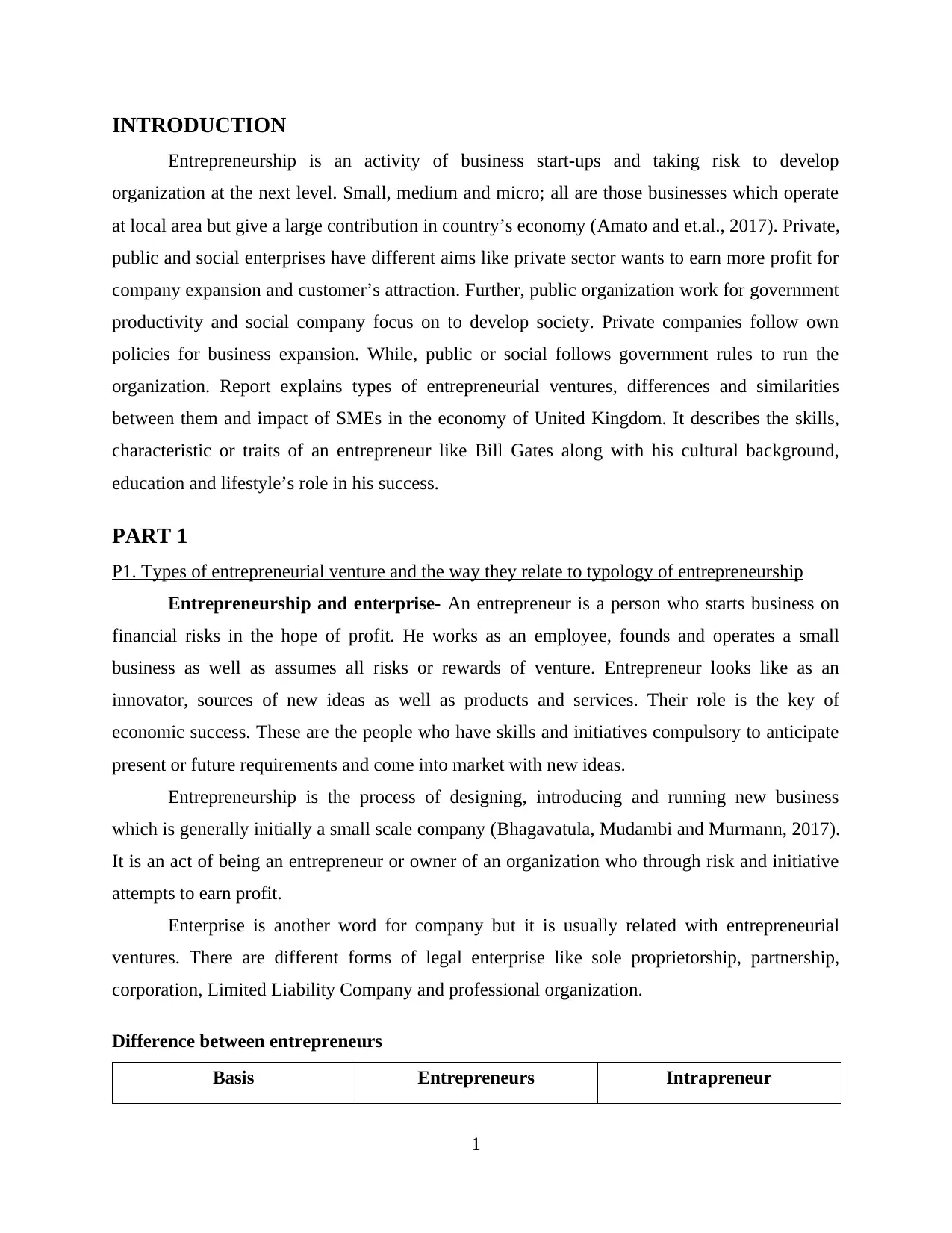
INTRODUCTION
Entrepreneurship is an activity of business start-ups and taking risk to develop
organization at the next level. Small, medium and micro; all are those businesses which operate
at local area but give a large contribution in country’s economy (Amato and et.al., 2017). Private,
public and social enterprises have different aims like private sector wants to earn more profit for
company expansion and customer’s attraction. Further, public organization work for government
productivity and social company focus on to develop society. Private companies follow own
policies for business expansion. While, public or social follows government rules to run the
organization. Report explains types of entrepreneurial ventures, differences and similarities
between them and impact of SMEs in the economy of United Kingdom. It describes the skills,
characteristic or traits of an entrepreneur like Bill Gates along with his cultural background,
education and lifestyle’s role in his success.
PART 1
P1. Types of entrepreneurial venture and the way they relate to typology of entrepreneurship
Entrepreneurship and enterprise- An entrepreneur is a person who starts business on
financial risks in the hope of profit. He works as an employee, founds and operates a small
business as well as assumes all risks or rewards of venture. Entrepreneur looks like as an
innovator, sources of new ideas as well as products and services. Their role is the key of
economic success. These are the people who have skills and initiatives compulsory to anticipate
present or future requirements and come into market with new ideas.
Entrepreneurship is the process of designing, introducing and running new business
which is generally initially a small scale company (Bhagavatula, Mudambi and Murmann, 2017).
It is an act of being an entrepreneur or owner of an organization who through risk and initiative
attempts to earn profit.
Enterprise is another word for company but it is usually related with entrepreneurial
ventures. There are different forms of legal enterprise like sole proprietorship, partnership,
corporation, Limited Liability Company and professional organization.
Difference between entrepreneurs
Basis Entrepreneurs Intrapreneur
1
Entrepreneurship is an activity of business start-ups and taking risk to develop
organization at the next level. Small, medium and micro; all are those businesses which operate
at local area but give a large contribution in country’s economy (Amato and et.al., 2017). Private,
public and social enterprises have different aims like private sector wants to earn more profit for
company expansion and customer’s attraction. Further, public organization work for government
productivity and social company focus on to develop society. Private companies follow own
policies for business expansion. While, public or social follows government rules to run the
organization. Report explains types of entrepreneurial ventures, differences and similarities
between them and impact of SMEs in the economy of United Kingdom. It describes the skills,
characteristic or traits of an entrepreneur like Bill Gates along with his cultural background,
education and lifestyle’s role in his success.
PART 1
P1. Types of entrepreneurial venture and the way they relate to typology of entrepreneurship
Entrepreneurship and enterprise- An entrepreneur is a person who starts business on
financial risks in the hope of profit. He works as an employee, founds and operates a small
business as well as assumes all risks or rewards of venture. Entrepreneur looks like as an
innovator, sources of new ideas as well as products and services. Their role is the key of
economic success. These are the people who have skills and initiatives compulsory to anticipate
present or future requirements and come into market with new ideas.
Entrepreneurship is the process of designing, introducing and running new business
which is generally initially a small scale company (Bhagavatula, Mudambi and Murmann, 2017).
It is an act of being an entrepreneur or owner of an organization who through risk and initiative
attempts to earn profit.
Enterprise is another word for company but it is usually related with entrepreneurial
ventures. There are different forms of legal enterprise like sole proprietorship, partnership,
corporation, Limited Liability Company and professional organization.
Difference between entrepreneurs
Basis Entrepreneurs Intrapreneur
1
⊘ This is a preview!⊘
Do you want full access?
Subscribe today to unlock all pages.

Trusted by 1+ million students worldwide
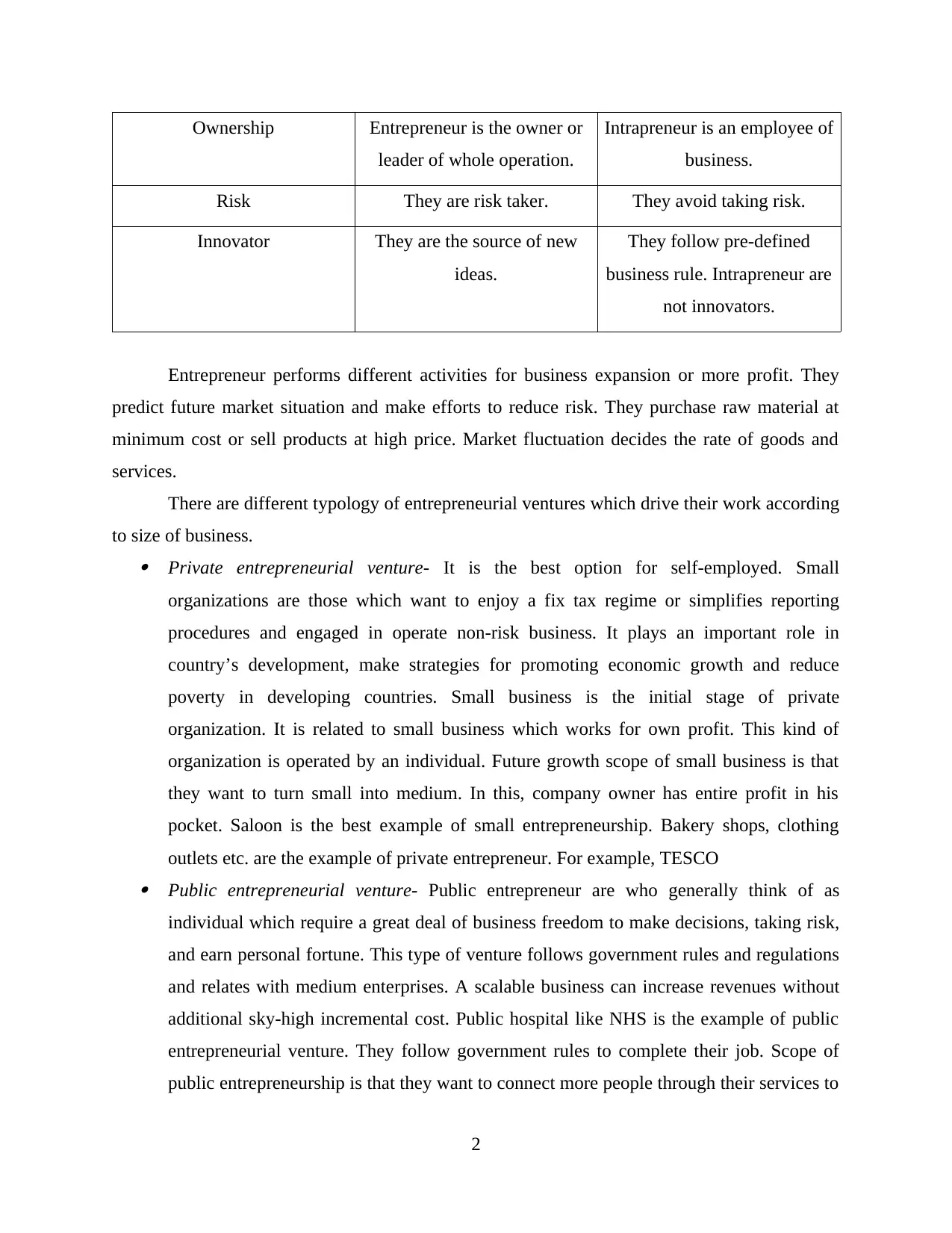
Ownership Entrepreneur is the owner or
leader of whole operation.
Intrapreneur is an employee of
business.
Risk They are risk taker. They avoid taking risk.
Innovator They are the source of new
ideas.
They follow pre-defined
business rule. Intrapreneur are
not innovators.
Entrepreneur performs different activities for business expansion or more profit. They
predict future market situation and make efforts to reduce risk. They purchase raw material at
minimum cost or sell products at high price. Market fluctuation decides the rate of goods and
services.
There are different typology of entrepreneurial ventures which drive their work according
to size of business. Private entrepreneurial venture- It is the best option for self-employed. Small
organizations are those which want to enjoy a fix tax regime or simplifies reporting
procedures and engaged in operate non-risk business. It plays an important role in
country’s development, make strategies for promoting economic growth and reduce
poverty in developing countries. Small business is the initial stage of private
organization. It is related to small business which works for own profit. This kind of
organization is operated by an individual. Future growth scope of small business is that
they want to turn small into medium. In this, company owner has entire profit in his
pocket. Saloon is the best example of small entrepreneurship. Bakery shops, clothing
outlets etc. are the example of private entrepreneur. For example, TESCO Public entrepreneurial venture- Public entrepreneur are who generally think of as
individual which require a great deal of business freedom to make decisions, taking risk,
and earn personal fortune. This type of venture follows government rules and regulations
and relates with medium enterprises. A scalable business can increase revenues without
additional sky-high incremental cost. Public hospital like NHS is the example of public
entrepreneurial venture. They follow government rules to complete their job. Scope of
public entrepreneurship is that they want to connect more people through their services to
2
leader of whole operation.
Intrapreneur is an employee of
business.
Risk They are risk taker. They avoid taking risk.
Innovator They are the source of new
ideas.
They follow pre-defined
business rule. Intrapreneur are
not innovators.
Entrepreneur performs different activities for business expansion or more profit. They
predict future market situation and make efforts to reduce risk. They purchase raw material at
minimum cost or sell products at high price. Market fluctuation decides the rate of goods and
services.
There are different typology of entrepreneurial ventures which drive their work according
to size of business. Private entrepreneurial venture- It is the best option for self-employed. Small
organizations are those which want to enjoy a fix tax regime or simplifies reporting
procedures and engaged in operate non-risk business. It plays an important role in
country’s development, make strategies for promoting economic growth and reduce
poverty in developing countries. Small business is the initial stage of private
organization. It is related to small business which works for own profit. This kind of
organization is operated by an individual. Future growth scope of small business is that
they want to turn small into medium. In this, company owner has entire profit in his
pocket. Saloon is the best example of small entrepreneurship. Bakery shops, clothing
outlets etc. are the example of private entrepreneur. For example, TESCO Public entrepreneurial venture- Public entrepreneur are who generally think of as
individual which require a great deal of business freedom to make decisions, taking risk,
and earn personal fortune. This type of venture follows government rules and regulations
and relates with medium enterprises. A scalable business can increase revenues without
additional sky-high incremental cost. Public hospital like NHS is the example of public
entrepreneurial venture. They follow government rules to complete their job. Scope of
public entrepreneurship is that they want to connect more people through their services to
2
Paraphrase This Document
Need a fresh take? Get an instant paraphrase of this document with our AI Paraphraser
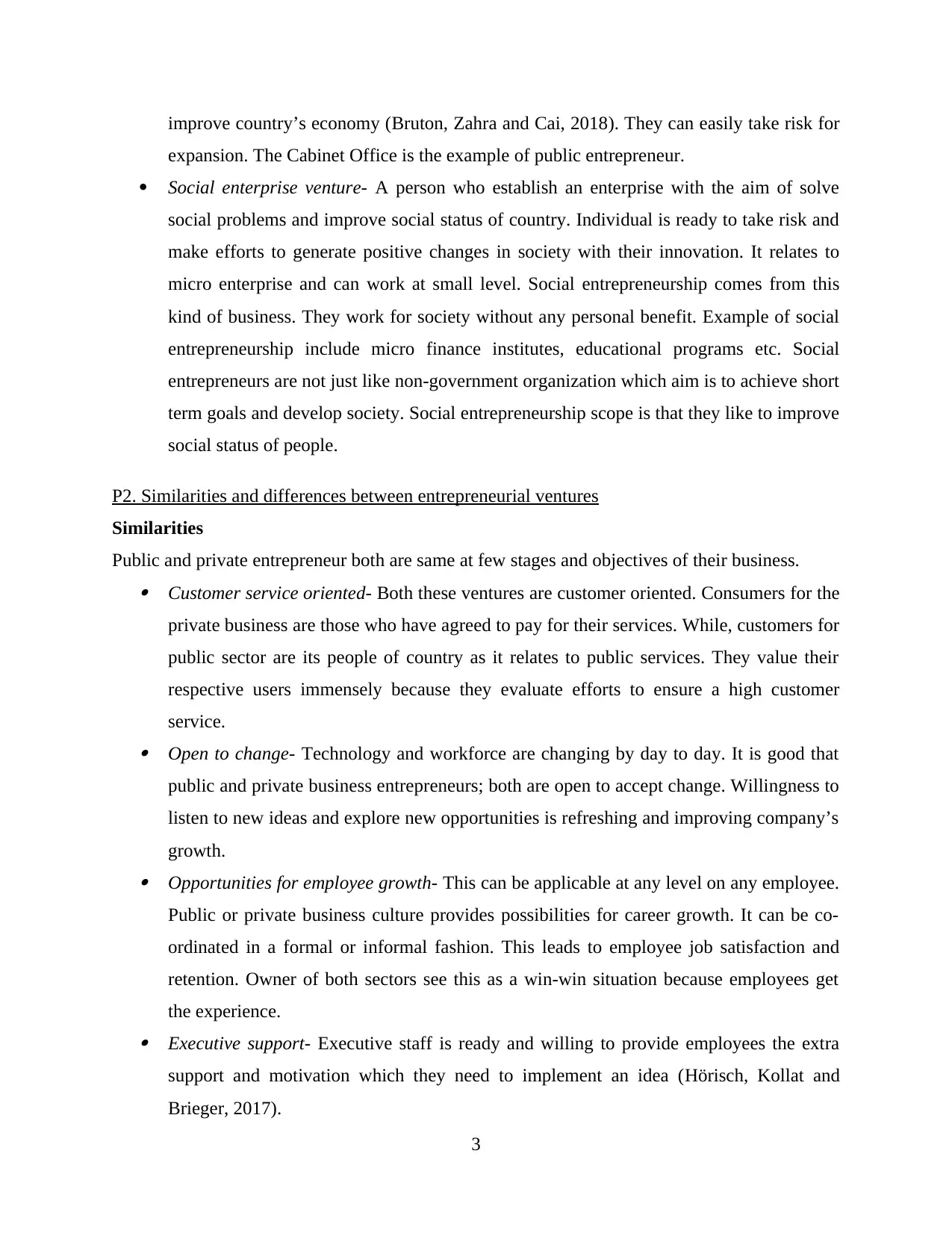
improve country’s economy (Bruton, Zahra and Cai, 2018). They can easily take risk for
expansion. The Cabinet Office is the example of public entrepreneur.
Social enterprise venture- A person who establish an enterprise with the aim of solve
social problems and improve social status of country. Individual is ready to take risk and
make efforts to generate positive changes in society with their innovation. It relates to
micro enterprise and can work at small level. Social entrepreneurship comes from this
kind of business. They work for society without any personal benefit. Example of social
entrepreneurship include micro finance institutes, educational programs etc. Social
entrepreneurs are not just like non-government organization which aim is to achieve short
term goals and develop society. Social entrepreneurship scope is that they like to improve
social status of people.
P2. Similarities and differences between entrepreneurial ventures
Similarities
Public and private entrepreneur both are same at few stages and objectives of their business. Customer service oriented- Both these ventures are customer oriented. Consumers for the
private business are those who have agreed to pay for their services. While, customers for
public sector are its people of country as it relates to public services. They value their
respective users immensely because they evaluate efforts to ensure a high customer
service. Open to change- Technology and workforce are changing by day to day. It is good that
public and private business entrepreneurs; both are open to accept change. Willingness to
listen to new ideas and explore new opportunities is refreshing and improving company’s
growth. Opportunities for employee growth- This can be applicable at any level on any employee.
Public or private business culture provides possibilities for career growth. It can be co-
ordinated in a formal or informal fashion. This leads to employee job satisfaction and
retention. Owner of both sectors see this as a win-win situation because employees get
the experience. Executive support- Executive staff is ready and willing to provide employees the extra
support and motivation which they need to implement an idea (Hörisch, Kollat and
Brieger, 2017).
3
expansion. The Cabinet Office is the example of public entrepreneur.
Social enterprise venture- A person who establish an enterprise with the aim of solve
social problems and improve social status of country. Individual is ready to take risk and
make efforts to generate positive changes in society with their innovation. It relates to
micro enterprise and can work at small level. Social entrepreneurship comes from this
kind of business. They work for society without any personal benefit. Example of social
entrepreneurship include micro finance institutes, educational programs etc. Social
entrepreneurs are not just like non-government organization which aim is to achieve short
term goals and develop society. Social entrepreneurship scope is that they like to improve
social status of people.
P2. Similarities and differences between entrepreneurial ventures
Similarities
Public and private entrepreneur both are same at few stages and objectives of their business. Customer service oriented- Both these ventures are customer oriented. Consumers for the
private business are those who have agreed to pay for their services. While, customers for
public sector are its people of country as it relates to public services. They value their
respective users immensely because they evaluate efforts to ensure a high customer
service. Open to change- Technology and workforce are changing by day to day. It is good that
public and private business entrepreneurs; both are open to accept change. Willingness to
listen to new ideas and explore new opportunities is refreshing and improving company’s
growth. Opportunities for employee growth- This can be applicable at any level on any employee.
Public or private business culture provides possibilities for career growth. It can be co-
ordinated in a formal or informal fashion. This leads to employee job satisfaction and
retention. Owner of both sectors see this as a win-win situation because employees get
the experience. Executive support- Executive staff is ready and willing to provide employees the extra
support and motivation which they need to implement an idea (Hörisch, Kollat and
Brieger, 2017).
3
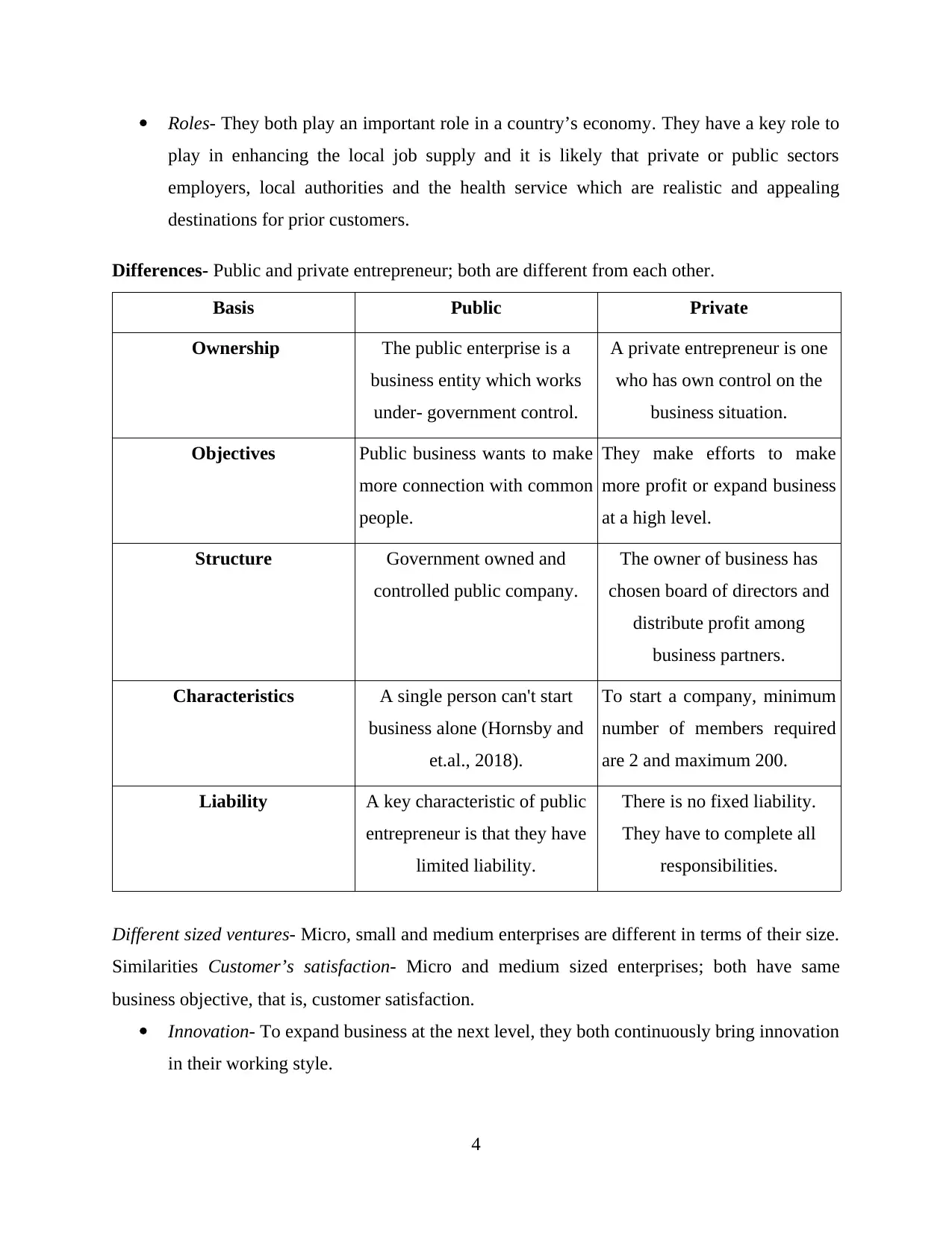
Roles- They both play an important role in a country’s economy. They have a key role to
play in enhancing the local job supply and it is likely that private or public sectors
employers, local authorities and the health service which are realistic and appealing
destinations for prior customers.
Differences- Public and private entrepreneur; both are different from each other.
Basis Public Private
Ownership The public enterprise is a
business entity which works
under- government control.
A private entrepreneur is one
who has own control on the
business situation.
Objectives Public business wants to make
more connection with common
people.
They make efforts to make
more profit or expand business
at a high level.
Structure Government owned and
controlled public company.
The owner of business has
chosen board of directors and
distribute profit among
business partners.
Characteristics A single person can't start
business alone (Hornsby and
et.al., 2018).
To start a company, minimum
number of members required
are 2 and maximum 200.
Liability A key characteristic of public
entrepreneur is that they have
limited liability.
There is no fixed liability.
They have to complete all
responsibilities.
Different sized ventures- Micro, small and medium enterprises are different in terms of their size.
Similarities Customer’s satisfaction- Micro and medium sized enterprises; both have same
business objective, that is, customer satisfaction.
Innovation- To expand business at the next level, they both continuously bring innovation
in their working style.
4
play in enhancing the local job supply and it is likely that private or public sectors
employers, local authorities and the health service which are realistic and appealing
destinations for prior customers.
Differences- Public and private entrepreneur; both are different from each other.
Basis Public Private
Ownership The public enterprise is a
business entity which works
under- government control.
A private entrepreneur is one
who has own control on the
business situation.
Objectives Public business wants to make
more connection with common
people.
They make efforts to make
more profit or expand business
at a high level.
Structure Government owned and
controlled public company.
The owner of business has
chosen board of directors and
distribute profit among
business partners.
Characteristics A single person can't start
business alone (Hornsby and
et.al., 2018).
To start a company, minimum
number of members required
are 2 and maximum 200.
Liability A key characteristic of public
entrepreneur is that they have
limited liability.
There is no fixed liability.
They have to complete all
responsibilities.
Different sized ventures- Micro, small and medium enterprises are different in terms of their size.
Similarities Customer’s satisfaction- Micro and medium sized enterprises; both have same
business objective, that is, customer satisfaction.
Innovation- To expand business at the next level, they both continuously bring innovation
in their working style.
4
⊘ This is a preview!⊘
Do you want full access?
Subscribe today to unlock all pages.

Trusted by 1+ million students worldwide
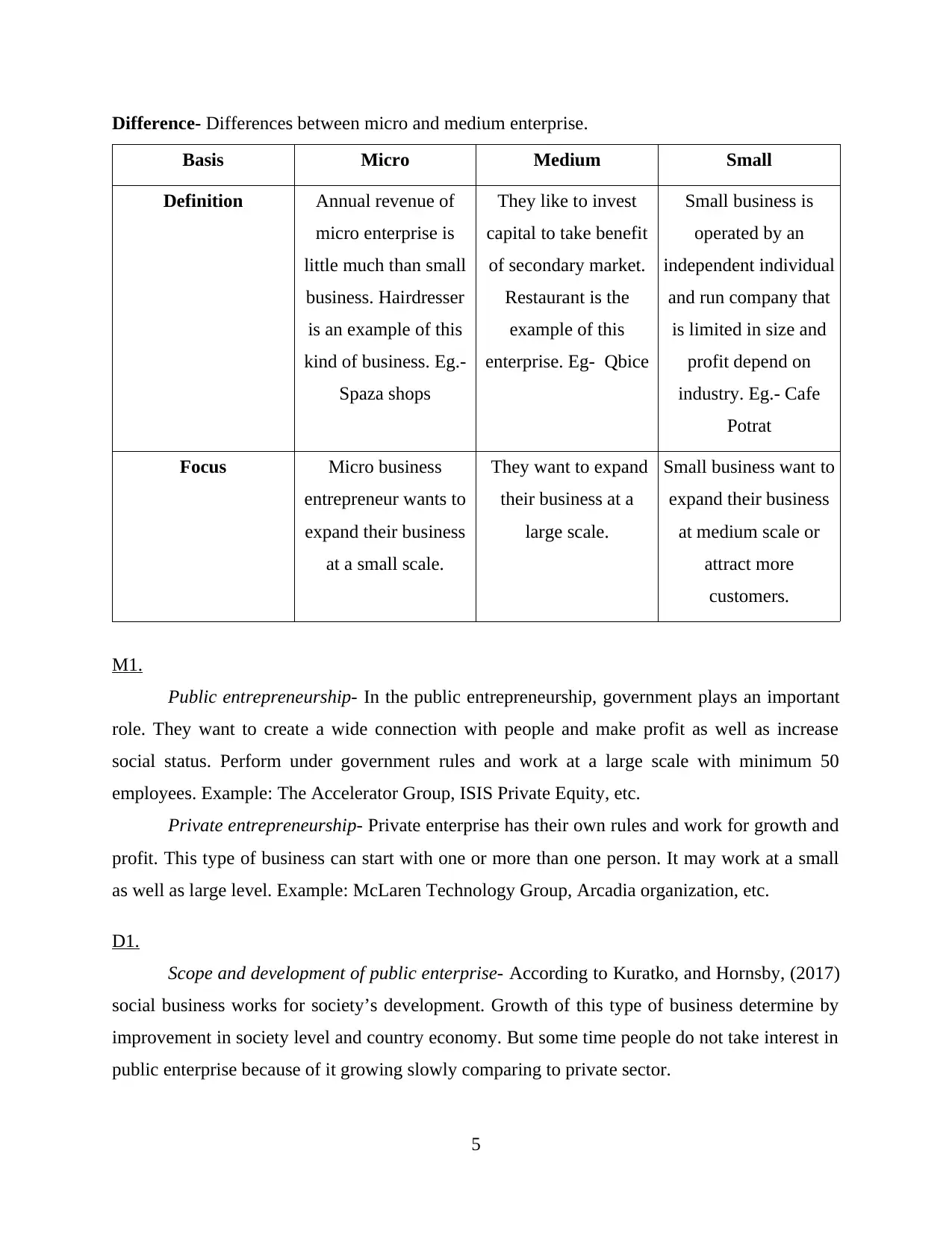
Difference- Differences between micro and medium enterprise.
Basis Micro Medium Small
Definition Annual revenue of
micro enterprise is
little much than small
business. Hairdresser
is an example of this
kind of business. Eg.-
Spaza shops
They like to invest
capital to take benefit
of secondary market.
Restaurant is the
example of this
enterprise. Eg- Qbice
Small business is
operated by an
independent individual
and run company that
is limited in size and
profit depend on
industry. Eg.- Cafe
Potrat
Focus Micro business
entrepreneur wants to
expand their business
at a small scale.
They want to expand
their business at a
large scale.
Small business want to
expand their business
at medium scale or
attract more
customers.
M1.
Public entrepreneurship- In the public entrepreneurship, government plays an important
role. They want to create a wide connection with people and make profit as well as increase
social status. Perform under government rules and work at a large scale with minimum 50
employees. Example: The Accelerator Group, ISIS Private Equity, etc.
Private entrepreneurship- Private enterprise has their own rules and work for growth and
profit. This type of business can start with one or more than one person. It may work at a small
as well as large level. Example: McLaren Technology Group, Arcadia organization, etc.
D1.
Scope and development of public enterprise- According to Kuratko, and Hornsby, (2017)
social business works for society’s development. Growth of this type of business determine by
improvement in society level and country economy. But some time people do not take interest in
public enterprise because of it growing slowly comparing to private sector.
5
Basis Micro Medium Small
Definition Annual revenue of
micro enterprise is
little much than small
business. Hairdresser
is an example of this
kind of business. Eg.-
Spaza shops
They like to invest
capital to take benefit
of secondary market.
Restaurant is the
example of this
enterprise. Eg- Qbice
Small business is
operated by an
independent individual
and run company that
is limited in size and
profit depend on
industry. Eg.- Cafe
Potrat
Focus Micro business
entrepreneur wants to
expand their business
at a small scale.
They want to expand
their business at a
large scale.
Small business want to
expand their business
at medium scale or
attract more
customers.
M1.
Public entrepreneurship- In the public entrepreneurship, government plays an important
role. They want to create a wide connection with people and make profit as well as increase
social status. Perform under government rules and work at a large scale with minimum 50
employees. Example: The Accelerator Group, ISIS Private Equity, etc.
Private entrepreneurship- Private enterprise has their own rules and work for growth and
profit. This type of business can start with one or more than one person. It may work at a small
as well as large level. Example: McLaren Technology Group, Arcadia organization, etc.
D1.
Scope and development of public enterprise- According to Kuratko, and Hornsby, (2017)
social business works for society’s development. Growth of this type of business determine by
improvement in society level and country economy. But some time people do not take interest in
public enterprise because of it growing slowly comparing to private sector.
5
Paraphrase This Document
Need a fresh take? Get an instant paraphrase of this document with our AI Paraphraser
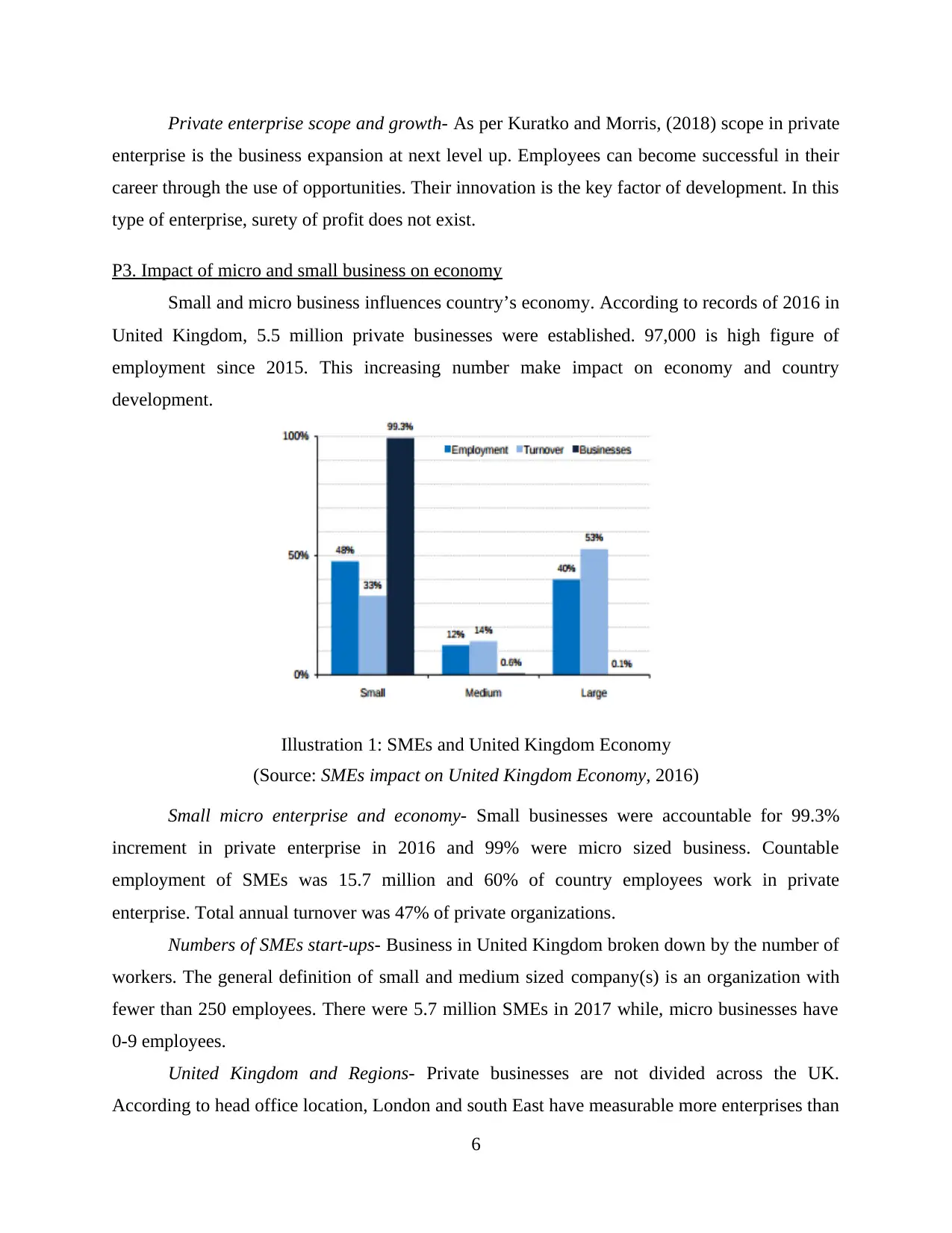
Private enterprise scope and growth- As per Kuratko and Morris, (2018) scope in private
enterprise is the business expansion at next level up. Employees can become successful in their
career through the use of opportunities. Their innovation is the key factor of development. In this
type of enterprise, surety of profit does not exist.
P3. Impact of micro and small business on economy
Small and micro business influences country’s economy. According to records of 2016 in
United Kingdom, 5.5 million private businesses were established. 97,000 is high figure of
employment since 2015. This increasing number make impact on economy and country
development.
Illustration 1: SMEs and United Kingdom Economy
(Source: SMEs impact on United Kingdom Economy, 2016)
Small micro enterprise and economy- Small businesses were accountable for 99.3%
increment in private enterprise in 2016 and 99% were micro sized business. Countable
employment of SMEs was 15.7 million and 60% of country employees work in private
enterprise. Total annual turnover was 47% of private organizations.
Numbers of SMEs start-ups- Business in United Kingdom broken down by the number of
workers. The general definition of small and medium sized company(s) is an organization with
fewer than 250 employees. There were 5.7 million SMEs in 2017 while, micro businesses have
0-9 employees.
United Kingdom and Regions- Private businesses are not divided across the UK.
According to head office location, London and south East have measurable more enterprises than
6
enterprise is the business expansion at next level up. Employees can become successful in their
career through the use of opportunities. Their innovation is the key factor of development. In this
type of enterprise, surety of profit does not exist.
P3. Impact of micro and small business on economy
Small and micro business influences country’s economy. According to records of 2016 in
United Kingdom, 5.5 million private businesses were established. 97,000 is high figure of
employment since 2015. This increasing number make impact on economy and country
development.
Illustration 1: SMEs and United Kingdom Economy
(Source: SMEs impact on United Kingdom Economy, 2016)
Small micro enterprise and economy- Small businesses were accountable for 99.3%
increment in private enterprise in 2016 and 99% were micro sized business. Countable
employment of SMEs was 15.7 million and 60% of country employees work in private
enterprise. Total annual turnover was 47% of private organizations.
Numbers of SMEs start-ups- Business in United Kingdom broken down by the number of
workers. The general definition of small and medium sized company(s) is an organization with
fewer than 250 employees. There were 5.7 million SMEs in 2017 while, micro businesses have
0-9 employees.
United Kingdom and Regions- Private businesses are not divided across the UK.
According to head office location, London and south East have measurable more enterprises than
6
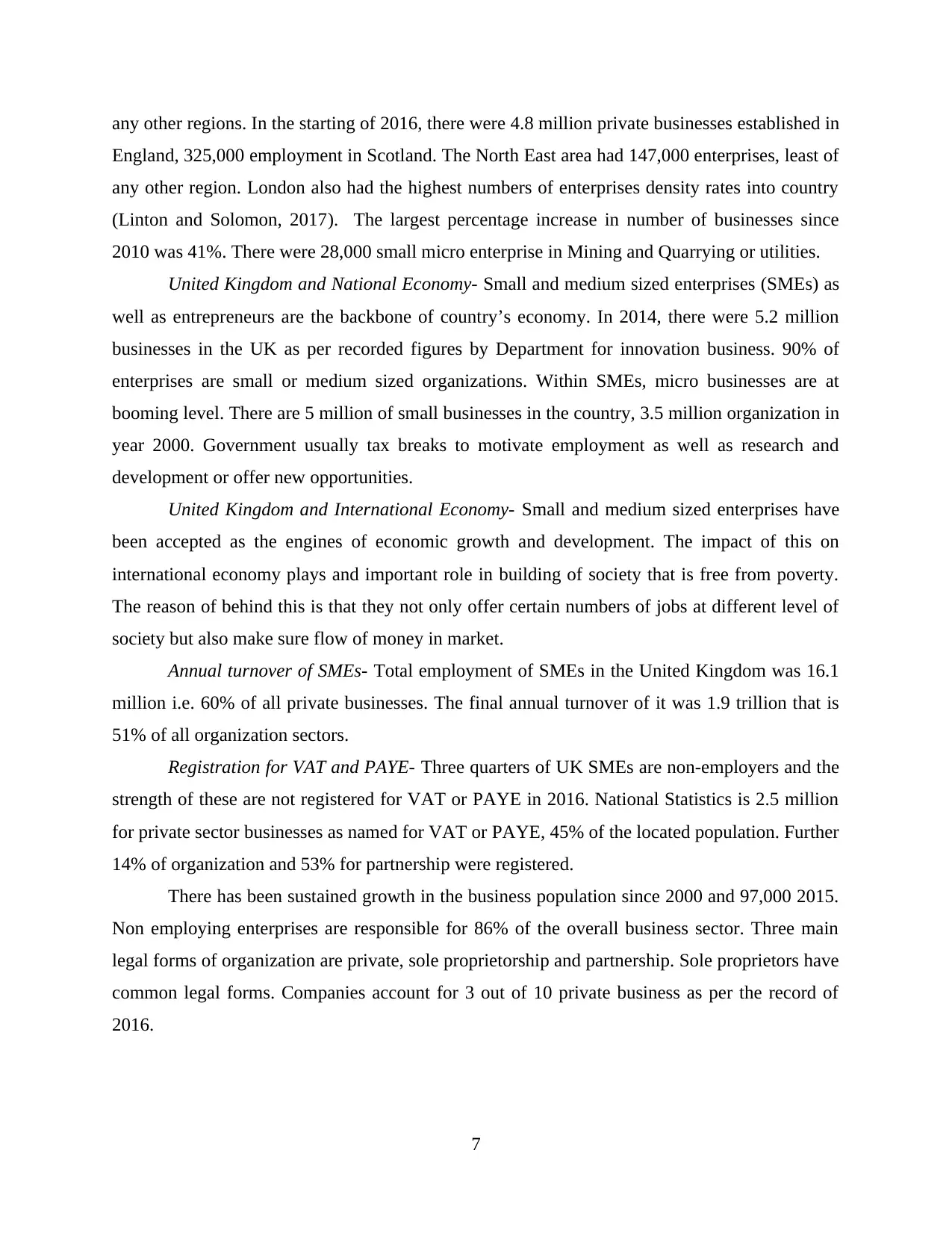
any other regions. In the starting of 2016, there were 4.8 million private businesses established in
England, 325,000 employment in Scotland. The North East area had 147,000 enterprises, least of
any other region. London also had the highest numbers of enterprises density rates into country
(Linton and Solomon, 2017). The largest percentage increase in number of businesses since
2010 was 41%. There were 28,000 small micro enterprise in Mining and Quarrying or utilities.
United Kingdom and National Economy- Small and medium sized enterprises (SMEs) as
well as entrepreneurs are the backbone of country’s economy. In 2014, there were 5.2 million
businesses in the UK as per recorded figures by Department for innovation business. 90% of
enterprises are small or medium sized organizations. Within SMEs, micro businesses are at
booming level. There are 5 million of small businesses in the country, 3.5 million organization in
year 2000. Government usually tax breaks to motivate employment as well as research and
development or offer new opportunities.
United Kingdom and International Economy- Small and medium sized enterprises have
been accepted as the engines of economic growth and development. The impact of this on
international economy plays and important role in building of society that is free from poverty.
The reason of behind this is that they not only offer certain numbers of jobs at different level of
society but also make sure flow of money in market.
Annual turnover of SMEs- Total employment of SMEs in the United Kingdom was 16.1
million i.e. 60% of all private businesses. The final annual turnover of it was 1.9 trillion that is
51% of all organization sectors.
Registration for VAT and PAYE- Three quarters of UK SMEs are non-employers and the
strength of these are not registered for VAT or PAYE in 2016. National Statistics is 2.5 million
for private sector businesses as named for VAT or PAYE, 45% of the located population. Further
14% of organization and 53% for partnership were registered.
There has been sustained growth in the business population since 2000 and 97,000 2015.
Non employing enterprises are responsible for 86% of the overall business sector. Three main
legal forms of organization are private, sole proprietorship and partnership. Sole proprietors have
common legal forms. Companies account for 3 out of 10 private business as per the record of
2016.
7
England, 325,000 employment in Scotland. The North East area had 147,000 enterprises, least of
any other region. London also had the highest numbers of enterprises density rates into country
(Linton and Solomon, 2017). The largest percentage increase in number of businesses since
2010 was 41%. There were 28,000 small micro enterprise in Mining and Quarrying or utilities.
United Kingdom and National Economy- Small and medium sized enterprises (SMEs) as
well as entrepreneurs are the backbone of country’s economy. In 2014, there were 5.2 million
businesses in the UK as per recorded figures by Department for innovation business. 90% of
enterprises are small or medium sized organizations. Within SMEs, micro businesses are at
booming level. There are 5 million of small businesses in the country, 3.5 million organization in
year 2000. Government usually tax breaks to motivate employment as well as research and
development or offer new opportunities.
United Kingdom and International Economy- Small and medium sized enterprises have
been accepted as the engines of economic growth and development. The impact of this on
international economy plays and important role in building of society that is free from poverty.
The reason of behind this is that they not only offer certain numbers of jobs at different level of
society but also make sure flow of money in market.
Annual turnover of SMEs- Total employment of SMEs in the United Kingdom was 16.1
million i.e. 60% of all private businesses. The final annual turnover of it was 1.9 trillion that is
51% of all organization sectors.
Registration for VAT and PAYE- Three quarters of UK SMEs are non-employers and the
strength of these are not registered for VAT or PAYE in 2016. National Statistics is 2.5 million
for private sector businesses as named for VAT or PAYE, 45% of the located population. Further
14% of organization and 53% for partnership were registered.
There has been sustained growth in the business population since 2000 and 97,000 2015.
Non employing enterprises are responsible for 86% of the overall business sector. Three main
legal forms of organization are private, sole proprietorship and partnership. Sole proprietors have
common legal forms. Companies account for 3 out of 10 private business as per the record of
2016.
7
⊘ This is a preview!⊘
Do you want full access?
Subscribe today to unlock all pages.

Trusted by 1+ million students worldwide
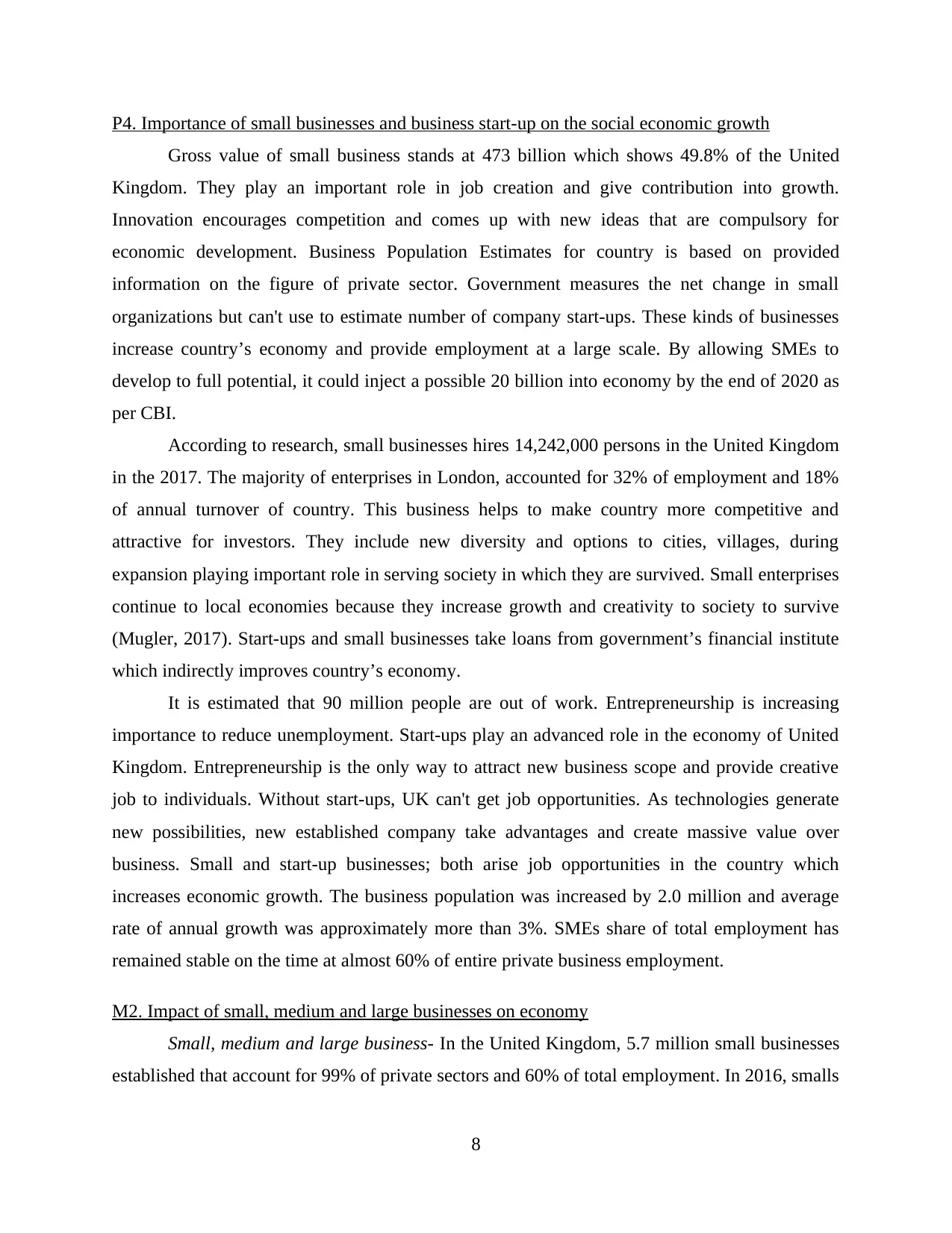
P4. Importance of small businesses and business start-up on the social economic growth
Gross value of small business stands at 473 billion which shows 49.8% of the United
Kingdom. They play an important role in job creation and give contribution into growth.
Innovation encourages competition and comes up with new ideas that are compulsory for
economic development. Business Population Estimates for country is based on provided
information on the figure of private sector. Government measures the net change in small
organizations but can't use to estimate number of company start-ups. These kinds of businesses
increase country’s economy and provide employment at a large scale. By allowing SMEs to
develop to full potential, it could inject a possible 20 billion into economy by the end of 2020 as
per CBI.
According to research, small businesses hires 14,242,000 persons in the United Kingdom
in the 2017. The majority of enterprises in London, accounted for 32% of employment and 18%
of annual turnover of country. This business helps to make country more competitive and
attractive for investors. They include new diversity and options to cities, villages, during
expansion playing important role in serving society in which they are survived. Small enterprises
continue to local economies because they increase growth and creativity to society to survive
(Mugler, 2017). Start-ups and small businesses take loans from government’s financial institute
which indirectly improves country’s economy.
It is estimated that 90 million people are out of work. Entrepreneurship is increasing
importance to reduce unemployment. Start-ups play an advanced role in the economy of United
Kingdom. Entrepreneurship is the only way to attract new business scope and provide creative
job to individuals. Without start-ups, UK can't get job opportunities. As technologies generate
new possibilities, new established company take advantages and create massive value over
business. Small and start-up businesses; both arise job opportunities in the country which
increases economic growth. The business population was increased by 2.0 million and average
rate of annual growth was approximately more than 3%. SMEs share of total employment has
remained stable on the time at almost 60% of entire private business employment.
M2. Impact of small, medium and large businesses on economy
Small, medium and large business- In the United Kingdom, 5.7 million small businesses
established that account for 99% of private sectors and 60% of total employment. In 2016, smalls
8
Gross value of small business stands at 473 billion which shows 49.8% of the United
Kingdom. They play an important role in job creation and give contribution into growth.
Innovation encourages competition and comes up with new ideas that are compulsory for
economic development. Business Population Estimates for country is based on provided
information on the figure of private sector. Government measures the net change in small
organizations but can't use to estimate number of company start-ups. These kinds of businesses
increase country’s economy and provide employment at a large scale. By allowing SMEs to
develop to full potential, it could inject a possible 20 billion into economy by the end of 2020 as
per CBI.
According to research, small businesses hires 14,242,000 persons in the United Kingdom
in the 2017. The majority of enterprises in London, accounted for 32% of employment and 18%
of annual turnover of country. This business helps to make country more competitive and
attractive for investors. They include new diversity and options to cities, villages, during
expansion playing important role in serving society in which they are survived. Small enterprises
continue to local economies because they increase growth and creativity to society to survive
(Mugler, 2017). Start-ups and small businesses take loans from government’s financial institute
which indirectly improves country’s economy.
It is estimated that 90 million people are out of work. Entrepreneurship is increasing
importance to reduce unemployment. Start-ups play an advanced role in the economy of United
Kingdom. Entrepreneurship is the only way to attract new business scope and provide creative
job to individuals. Without start-ups, UK can't get job opportunities. As technologies generate
new possibilities, new established company take advantages and create massive value over
business. Small and start-up businesses; both arise job opportunities in the country which
increases economic growth. The business population was increased by 2.0 million and average
rate of annual growth was approximately more than 3%. SMEs share of total employment has
remained stable on the time at almost 60% of entire private business employment.
M2. Impact of small, medium and large businesses on economy
Small, medium and large business- In the United Kingdom, 5.7 million small businesses
established that account for 99% of private sectors and 60% of total employment. In 2016, smalls
8
Paraphrase This Document
Need a fresh take? Get an instant paraphrase of this document with our AI Paraphraser
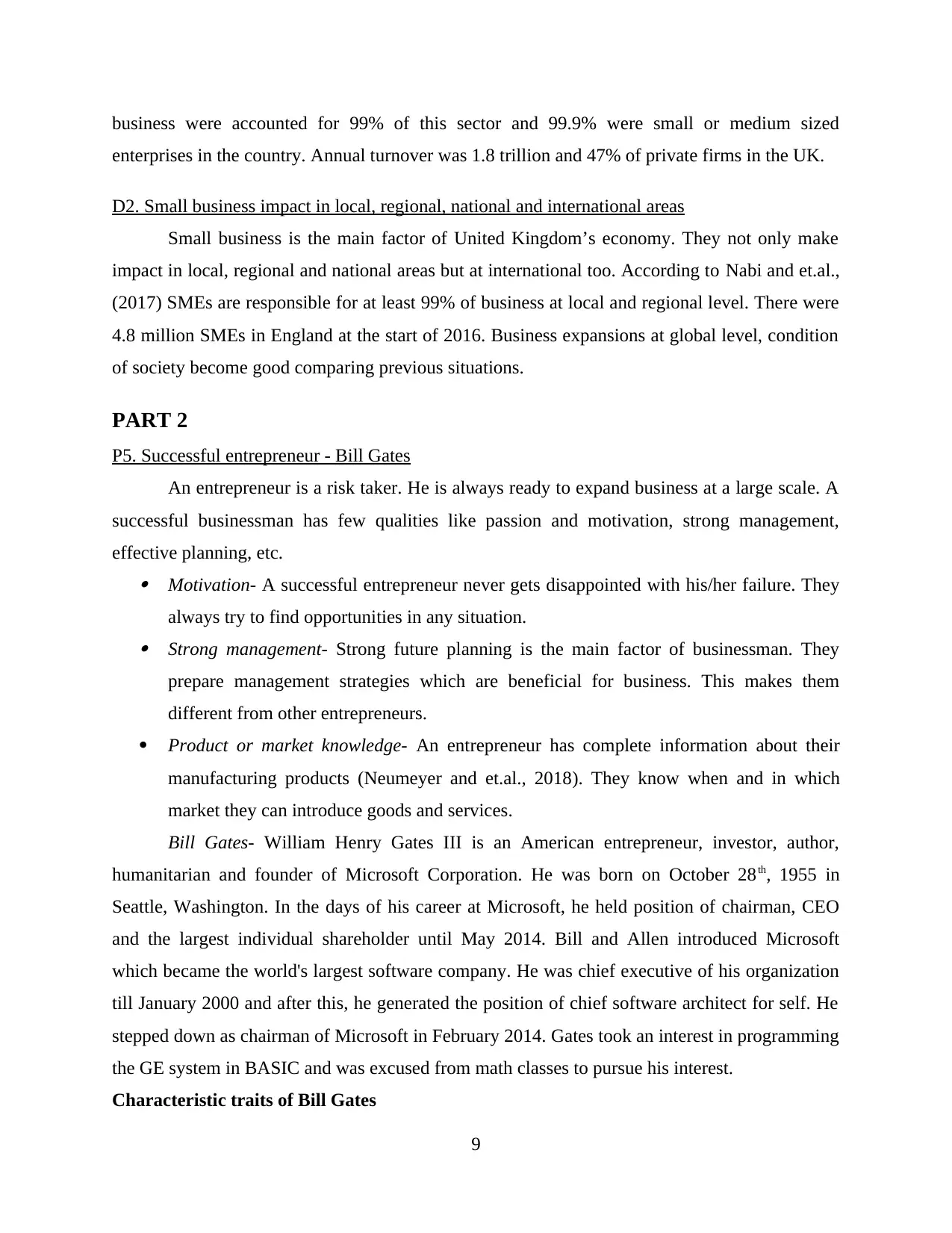
business were accounted for 99% of this sector and 99.9% were small or medium sized
enterprises in the country. Annual turnover was 1.8 trillion and 47% of private firms in the UK.
D2. Small business impact in local, regional, national and international areas
Small business is the main factor of United Kingdom’s economy. They not only make
impact in local, regional and national areas but at international too. According to Nabi and et.al.,
(2017) SMEs are responsible for at least 99% of business at local and regional level. There were
4.8 million SMEs in England at the start of 2016. Business expansions at global level, condition
of society become good comparing previous situations.
PART 2
P5. Successful entrepreneur - Bill Gates
An entrepreneur is a risk taker. He is always ready to expand business at a large scale. A
successful businessman has few qualities like passion and motivation, strong management,
effective planning, etc. Motivation- A successful entrepreneur never gets disappointed with his/her failure. They
always try to find opportunities in any situation. Strong management- Strong future planning is the main factor of businessman. They
prepare management strategies which are beneficial for business. This makes them
different from other entrepreneurs.
Product or market knowledge- An entrepreneur has complete information about their
manufacturing products (Neumeyer and et.al., 2018). They know when and in which
market they can introduce goods and services.
Bill Gates- William Henry Gates III is an American entrepreneur, investor, author,
humanitarian and founder of Microsoft Corporation. He was born on October 28th, 1955 in
Seattle, Washington. In the days of his career at Microsoft, he held position of chairman, CEO
and the largest individual shareholder until May 2014. Bill and Allen introduced Microsoft
which became the world's largest software company. He was chief executive of his organization
till January 2000 and after this, he generated the position of chief software architect for self. He
stepped down as chairman of Microsoft in February 2014. Gates took an interest in programming
the GE system in BASIC and was excused from math classes to pursue his interest.
Characteristic traits of Bill Gates
9
enterprises in the country. Annual turnover was 1.8 trillion and 47% of private firms in the UK.
D2. Small business impact in local, regional, national and international areas
Small business is the main factor of United Kingdom’s economy. They not only make
impact in local, regional and national areas but at international too. According to Nabi and et.al.,
(2017) SMEs are responsible for at least 99% of business at local and regional level. There were
4.8 million SMEs in England at the start of 2016. Business expansions at global level, condition
of society become good comparing previous situations.
PART 2
P5. Successful entrepreneur - Bill Gates
An entrepreneur is a risk taker. He is always ready to expand business at a large scale. A
successful businessman has few qualities like passion and motivation, strong management,
effective planning, etc. Motivation- A successful entrepreneur never gets disappointed with his/her failure. They
always try to find opportunities in any situation. Strong management- Strong future planning is the main factor of businessman. They
prepare management strategies which are beneficial for business. This makes them
different from other entrepreneurs.
Product or market knowledge- An entrepreneur has complete information about their
manufacturing products (Neumeyer and et.al., 2018). They know when and in which
market they can introduce goods and services.
Bill Gates- William Henry Gates III is an American entrepreneur, investor, author,
humanitarian and founder of Microsoft Corporation. He was born on October 28th, 1955 in
Seattle, Washington. In the days of his career at Microsoft, he held position of chairman, CEO
and the largest individual shareholder until May 2014. Bill and Allen introduced Microsoft
which became the world's largest software company. He was chief executive of his organization
till January 2000 and after this, he generated the position of chief software architect for self. He
stepped down as chairman of Microsoft in February 2014. Gates took an interest in programming
the GE system in BASIC and was excused from math classes to pursue his interest.
Characteristic traits of Bill Gates
9
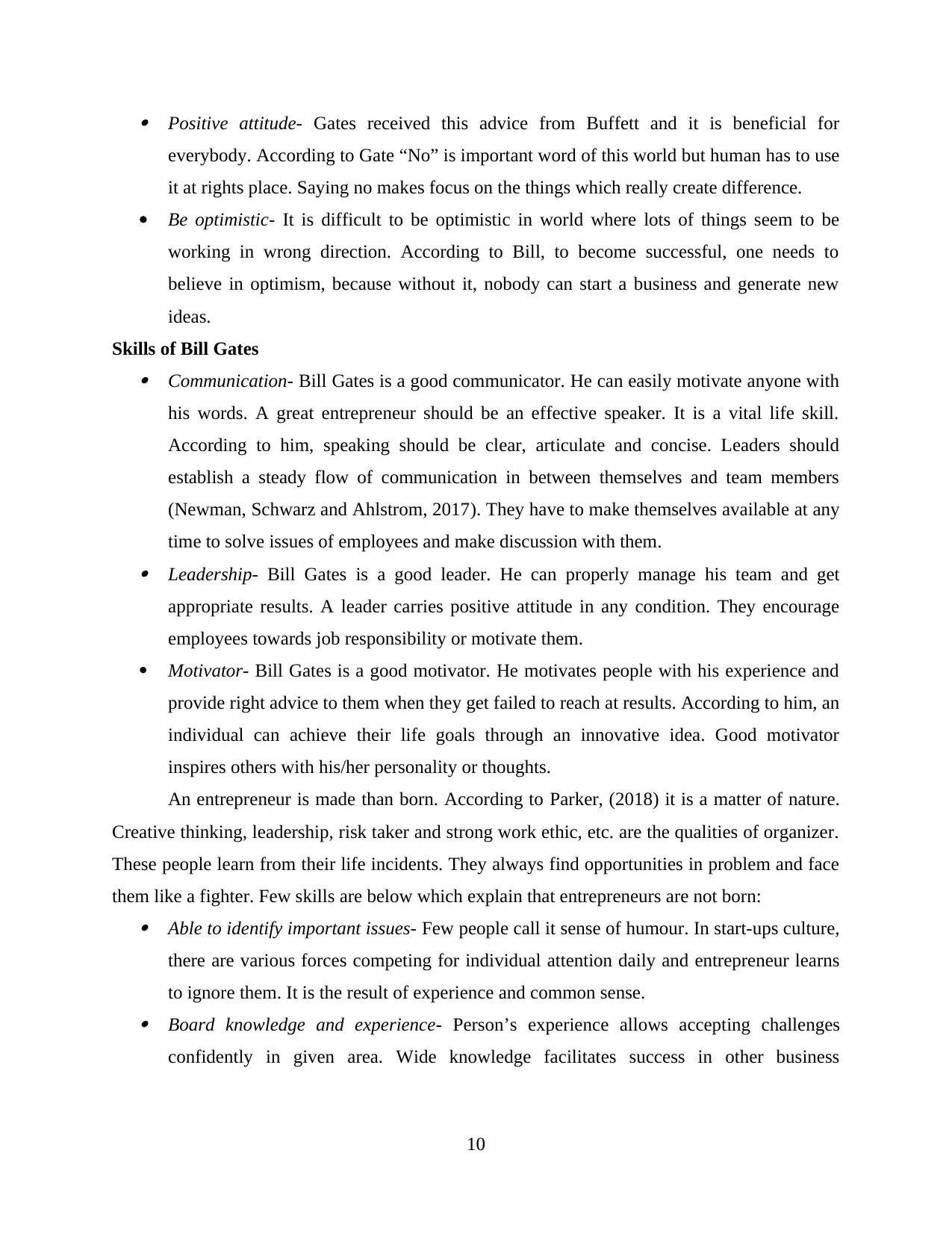
Positive attitude- Gates received this advice from Buffett and it is beneficial for
everybody. According to Gate “No” is important word of this world but human has to use
it at rights place. Saying no makes focus on the things which really create difference.
Be optimistic- It is difficult to be optimistic in world where lots of things seem to be
working in wrong direction. According to Bill, to become successful, one needs to
believe in optimism, because without it, nobody can start a business and generate new
ideas.
Skills of Bill Gates Communication- Bill Gates is a good communicator. He can easily motivate anyone with
his words. A great entrepreneur should be an effective speaker. It is a vital life skill.
According to him, speaking should be clear, articulate and concise. Leaders should
establish a steady flow of communication in between themselves and team members
(Newman, Schwarz and Ahlstrom, 2017). They have to make themselves available at any
time to solve issues of employees and make discussion with them. Leadership- Bill Gates is a good leader. He can properly manage his team and get
appropriate results. A leader carries positive attitude in any condition. They encourage
employees towards job responsibility or motivate them.
Motivator- Bill Gates is a good motivator. He motivates people with his experience and
provide right advice to them when they get failed to reach at results. According to him, an
individual can achieve their life goals through an innovative idea. Good motivator
inspires others with his/her personality or thoughts.
An entrepreneur is made than born. According to Parker, (2018) it is a matter of nature.
Creative thinking, leadership, risk taker and strong work ethic, etc. are the qualities of organizer.
These people learn from their life incidents. They always find opportunities in problem and face
them like a fighter. Few skills are below which explain that entrepreneurs are not born: Able to identify important issues- Few people call it sense of humour. In start-ups culture,
there are various forces competing for individual attention daily and entrepreneur learns
to ignore them. It is the result of experience and common sense. Board knowledge and experience- Person’s experience allows accepting challenges
confidently in given area. Wide knowledge facilitates success in other business
10
everybody. According to Gate “No” is important word of this world but human has to use
it at rights place. Saying no makes focus on the things which really create difference.
Be optimistic- It is difficult to be optimistic in world where lots of things seem to be
working in wrong direction. According to Bill, to become successful, one needs to
believe in optimism, because without it, nobody can start a business and generate new
ideas.
Skills of Bill Gates Communication- Bill Gates is a good communicator. He can easily motivate anyone with
his words. A great entrepreneur should be an effective speaker. It is a vital life skill.
According to him, speaking should be clear, articulate and concise. Leaders should
establish a steady flow of communication in between themselves and team members
(Newman, Schwarz and Ahlstrom, 2017). They have to make themselves available at any
time to solve issues of employees and make discussion with them. Leadership- Bill Gates is a good leader. He can properly manage his team and get
appropriate results. A leader carries positive attitude in any condition. They encourage
employees towards job responsibility or motivate them.
Motivator- Bill Gates is a good motivator. He motivates people with his experience and
provide right advice to them when they get failed to reach at results. According to him, an
individual can achieve their life goals through an innovative idea. Good motivator
inspires others with his/her personality or thoughts.
An entrepreneur is made than born. According to Parker, (2018) it is a matter of nature.
Creative thinking, leadership, risk taker and strong work ethic, etc. are the qualities of organizer.
These people learn from their life incidents. They always find opportunities in problem and face
them like a fighter. Few skills are below which explain that entrepreneurs are not born: Able to identify important issues- Few people call it sense of humour. In start-ups culture,
there are various forces competing for individual attention daily and entrepreneur learns
to ignore them. It is the result of experience and common sense. Board knowledge and experience- Person’s experience allows accepting challenges
confidently in given area. Wide knowledge facilitates success in other business
10
⊘ This is a preview!⊘
Do you want full access?
Subscribe today to unlock all pages.

Trusted by 1+ million students worldwide
1 out of 17
Related Documents
Your All-in-One AI-Powered Toolkit for Academic Success.
+13062052269
info@desklib.com
Available 24*7 on WhatsApp / Email
![[object Object]](/_next/static/media/star-bottom.7253800d.svg)
Unlock your academic potential
Copyright © 2020–2026 A2Z Services. All Rights Reserved. Developed and managed by ZUCOL.



